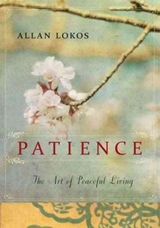 by John Baldoni –
by John Baldoni –
Having trouble mastering patience?
Well, to combat that, you could try standing in the longest line at the supermarket. Or, when driving on the freeway, get behind someone observing the speed limit—and stay there. Or, if someone yells at you because you are not paying attention, turn and give him or her a big compliment.
The above suggestions were made by callers to an episode of NPR’s Talk of the Nation that featured author Allan Lokos speaking about his new book, Patience: The Art of Peaceful Living. Allan’s book is filled with many practical suggestions for how you can master patience.
Patience is a matter of control. I certainly do not possess it, but I do admire those who do. And as someone who likes to be in control, as do most executives with whom I work, control may open the window to developing greater levels of patience.
Boil it down to the maxim, “control what you can control and let the rest go.” Patience, as Lokos explains, can be helpful when coping with the aging process. We cannot control what happens to us but we can control how we respond to it.
Patience unfairly is perceived as a passive act. In reality, as we know from the Buddhist tradition, it is all about self-mastery, and that requires absolute control over one’s thoughts, words, and deeds. Instead of directing your desire to control others, focus instead on yourself. Consider the following tips, many of which are standard meditation techniques:
- Focus on your breathing. In and out, one breath at a time.
- Take a walk and look for something you have not seen before.
- Sit in your favorite chair and reflect on your day. (Don’t turn on the TV or your music player.)
- Regard conversation as discussion not a contest. Listen to what the other person has to say. Pause before replying.
- Smile more. Practice in the mirror to see how long you can keep going.
- Pick up a favorite keepsake. Savor the memories it recalls.
Consider these as thought-starters. Think of one more you could add.
And remember: as virtuous as patience may be, it has its limits. For example, how long should you put up with an employee who is going through the motions and not contributing? Or how long should you endure a boss who cannot make a decision, and risks running your project off the rails? Or how long should you remain in an organization that has values that do not complement your own?
Patient leaders are not pacifists per se; they are often activists by nature. They are more like former Prime Minister Margaret Thatcher who quipped, “I am extraordinarily patient, provided I get my own way in the end.”
Such leaders want to make things happen. And they act for the good of the team. But along the way they have learned that too much action is really inaction. Never mistake activity for productivity. And so it behooves us to slow things down and control what we can control.
And so next time I visit a grocery store I may head for a checkout line of medium length. My patience may not endure a long one.
HT: Inc.com
